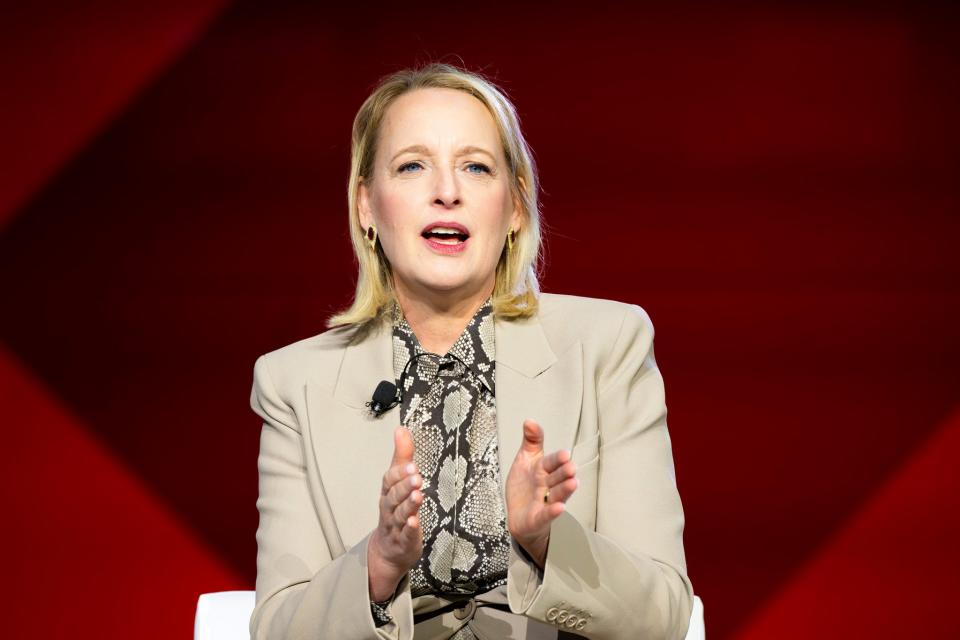Accenture CEO Julie Sweet shares why her firm is acquiring Udacity to launch an AI-powered training platform

In her first webcast, on her first day as CEO of Accenture in 2019, Julie Sweet announced the launch of a Technology Quotient program to make sure every employee would get a basic knowledge of key technologies.
“It was really a step change to say that technology is now a basic skill for everyone at Accenture, and we're going to provide you with those skills,” says Sweet, who also became chair of the board in 2021. “We knew that every company, including Accenture, would reinvent itself using cloud, data, and AI—and we wanted our people ready.”
Now the firm is taking steps to ensure its clients’ people are ready too.
On Tuesday, Accenture announced the acquisition of the online learning platform Udacity as part of a new suite of learning and training services to help clients reskill and upskill their workers in technology, data, and AI. The AI-powered suite, called Accenture LearnVantage, uses a recommendation engine to identify skill gaps and deliver personalized learning experiences to everyone from developers to board members. Along with capitalizing on Accenture’s internal expertise, the new platform reflects the growing need to help companies implement technologies that touch every part of the organization.
Although Accenture is one of many consultancies helping clients train staff in the latest technologies, the firm is making big bets. In June, it announced a $3 billion investment over three years to build out its data and AI practice. In Tuesday’s announcement, Accenture pledged an additional $1 billion toward expanding LearnVantage over the next three years. (The financial terms of the Udacity acquisition were not disclosed.) As a leading systems integrator, Accenture has insights on skills gaps as it’s helping clients transform. “In terms of our strategy,” Sweet says, “what this is about is continuing to invest.”
As Sweet told Fortune in an interview ahead of the Tuesday announcement, client demand for help with training is already high. Accenture research shows that business leaders consider upskilling workers to be their top challenge, with 51% of organizations starting to see negative impacts from worsening IT skills shortages. At the same time, Accenture reports, 94% of workers say they want to learn new skills to work with generative AI, but only 5% of organizations provide gen AI training at scale.
But why acquire Udacity, a platform that was reported to be an acquisition target for the Indian edtech firm upGrad just weeks ago? Sweet cites Udacity’s library of content and network of experts, along with its local-language offerings and “learn by doing” ethos, as key strengths. “It’s very different than other learning platforms,” she says. “Our acquisition strategy is to bring in new skills and to scale… Just as we are a world-class learning organization, they're a world-class education organization.”
Still, many workers fear that investments in AI training may eventually put them out of a job. Accenture estimates that AI will ultimately impact 40% of working hours across industries. And transitions come at a cost: Accenture is still processing some 19,000 job cuts announced a year ago amid business and economic shifts. Painful as those cuts have been, Sweet argues that many of Accenture’s 743,000 workers have thrived because they are able to upskill and reskill to where the growth is going to be.
“Having a learning culture and having a learning infrastructure allows us to go after growth,” she says. “You’re not going to be able to reskill and redeploy everyone, but if you have the capabilities, you're going to be able to do more than you would if you didn't.”
If Sweet wants to ponder the possibilities that come with a learning mindset, she can look in the mirror. “If a lawyer who used paper files can become the head of a technology company, the sky's the limit in learning,” she says of her own evolution.
And what’s top of her learning slate? “I'm going industry by industry to get deeper and deeper,” she says. “Along with gen AI, I also have quantum and science technology on the agenda, but there is a long runway for me. I cover 19 industries, and to go deep in every industry on how gen AI is going to transform it is going to take me a while.”
This story was originally featured on Fortune.com
